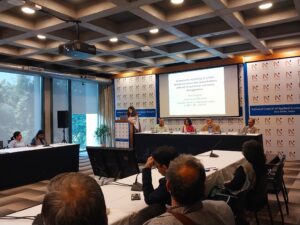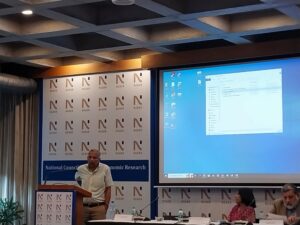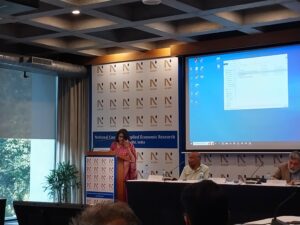 NCAER organised an in-person lecture on ‘Econometric modelling of carbon dioxide emissions and concentrations, ambient temperatures and ocean deoxygenation, by Prof. Alok Bhargava, Professor, University of Maryland, on Friday, 8 March 2024, 3:00 pm, as part of its Dialogue Room Seminar Series.
NCAER organised an in-person lecture on ‘Econometric modelling of carbon dioxide emissions and concentrations, ambient temperatures and ocean deoxygenation, by Prof. Alok Bhargava, Professor, University of Maryland, on Friday, 8 March 2024, 3:00 pm, as part of its Dialogue Room Seminar Series.
Details of the paper presented and bios of the Speaker, Chair and the Discussants are shared below.
Abstract
 This paper analysed several longitudinal data sets for investigating the dynamic inter-relationships between CO2 emissions and atmospheric concentrations, ambient temperatures and ocean acidification and deoxygenation. The methodological framework addressed issues such as the use of temperature ‘anomalies’, diffusion of CO2 to atmospheric stations, distributional misspecification and non-stationarity of errors affecting empirical models, and use of spline functions for modelling trends in temperatures. Longitudinal data on CO2 emissions for 163 countries and atmospheric CO2 concentrations at 10
This paper analysed several longitudinal data sets for investigating the dynamic inter-relationships between CO2 emissions and atmospheric concentrations, ambient temperatures and ocean acidification and deoxygenation. The methodological framework addressed issues such as the use of temperature ‘anomalies’, diffusion of CO2 to atmospheric stations, distributional misspecification and non-stationarity of errors affecting empirical models, and use of spline functions for modelling trends in temperatures. Longitudinal data on CO2 emissions for 163 countries and atmospheric CO2 concentrations at 10  stations, ambient temperatures from over 8,500 weather stations and seawater composition from over 380,000 oceanographic stations were analysed for 1985–2018 by estimating dynamic random effects models using maximum likelihood methods. The main findings were that CO2 emissions exhibited rapid upward trends at the country level, while minimum and maximum temperatures showed cyclical patterns; economic activity and population levels were associated with higher CO2 emissions. Second, there were gradual upward trends in annual and seasonal temperatures compiled at weather stations, and atmospheric CO2 concentrations were significantly associated with higher temperatures in the hemispheres. Third, there was a steady decline in dissolved oxygen levels, and the interactive effects of water temperatures and pH levels were significant. Overall, the results underscore the benefits of reducing CO2 emissions for ambient temperatures and for ocean deoxygenation. Synergies between CO2 emissions, ambient temperatures and ocean acidification are likely to exacerbate the melting of polar ice.
stations, ambient temperatures from over 8,500 weather stations and seawater composition from over 380,000 oceanographic stations were analysed for 1985–2018 by estimating dynamic random effects models using maximum likelihood methods. The main findings were that CO2 emissions exhibited rapid upward trends at the country level, while minimum and maximum temperatures showed cyclical patterns; economic activity and population levels were associated with higher CO2 emissions. Second, there were gradual upward trends in annual and seasonal temperatures compiled at weather stations, and atmospheric CO2 concentrations were significantly associated with higher temperatures in the hemispheres. Third, there was a steady decline in dissolved oxygen levels, and the interactive effects of water temperatures and pH levels were significant. Overall, the results underscore the benefits of reducing CO2 emissions for ambient temperatures and for ocean deoxygenation. Synergies between CO2 emissions, ambient temperatures and ocean acidification are likely to exacerbate the melting of polar ice.
Speaker
 Alok Bhargava is a Professor and Senior Fellow, in Center for Global Sustainability, University of Maryland. Alok Bhargava received his PhD in econometrics in 1982 from the London School of Economics. Dr. Bhargava has taught at University of Pennsylvania, Harvard University, University of Paris, and University of Houston. His research has applied econometric methods for tackling complex policy issues in economic development, health, nutrition, child development, AIDS, obesity, environmental sciences, climate change, and corporate finance. Dr. Bhargava has advised international agencies such as the World Bank, International Food Policy Research Institute, Organization for Economic Cooperation and Development, US Department of Agriculture, Centers for Disease Control and Prevention, and National Institutes of Health. Most of his research articles have been published in top tier academic journals in disciplines such as economics, anthropology, nutrition, psychology, and health sciences.
Alok Bhargava is a Professor and Senior Fellow, in Center for Global Sustainability, University of Maryland. Alok Bhargava received his PhD in econometrics in 1982 from the London School of Economics. Dr. Bhargava has taught at University of Pennsylvania, Harvard University, University of Paris, and University of Houston. His research has applied econometric methods for tackling complex policy issues in economic development, health, nutrition, child development, AIDS, obesity, environmental sciences, climate change, and corporate finance. Dr. Bhargava has advised international agencies such as the World Bank, International Food Policy Research Institute, Organization for Economic Cooperation and Development, US Department of Agriculture, Centers for Disease Control and Prevention, and National Institutes of Health. Most of his research articles have been published in top tier academic journals in disciplines such as economics, anthropology, nutrition, psychology, and health sciences.
Chair
 Sanjib Pohit is a Professor at NCAER. He is an experienced modeler in the area of trade and environment with 20 years of modelling experience. His domain of research experience includes science and technology policies, institutional economics, transport economics, input-output models, FDI, informal trade, automobile industry, and South Asian integration. Previously, he held position at CSIR-National Institute of Science, Technology & Development Studies as Professor AcSIR & Senior Principal Scientist. He has served as members of several committees of Government of India including climate Change Modelling group of Ministry of Environment, Forest and Climate Change. He has published in several reputed journals.
Sanjib Pohit is a Professor at NCAER. He is an experienced modeler in the area of trade and environment with 20 years of modelling experience. His domain of research experience includes science and technology policies, institutional economics, transport economics, input-output models, FDI, informal trade, automobile industry, and South Asian integration. Previously, he held position at CSIR-National Institute of Science, Technology & Development Studies as Professor AcSIR & Senior Principal Scientist. He has served as members of several committees of Government of India including climate Change Modelling group of Ministry of Environment, Forest and Climate Change. He has published in several reputed journals.
Discussants
 Purnamita Dasgupta is Chair Professor in Environmental & Resource Economics at the Institute of Economic Growth, Delhi. She has been visiting professor at University of Cambridge, UK and Johns Hopkins University, USA. Her teaching and research focus on the relationship between environment and economic development. Her research assignments include CLA of the IPCC and IPSP, author HIMAP, Advisor IPCC’s Scientific Steering Group on Economics, Costing and Ethics; CARIAA and the Association of Commonwealth Universities, UK. She has contributed to modelling for India’s NDCs and NATCOM processes, drafting regulation on e-waste, natural resource accounting for the CAG, Supreme Court committee on NPV for Forests, committee to evolve environmental standards, among others. She has published in journals such as Climatic Change, PLOS One, Environment and Development Economics, Environmental Development, Environmental Health Perspectives.
Purnamita Dasgupta is Chair Professor in Environmental & Resource Economics at the Institute of Economic Growth, Delhi. She has been visiting professor at University of Cambridge, UK and Johns Hopkins University, USA. Her teaching and research focus on the relationship between environment and economic development. Her research assignments include CLA of the IPCC and IPSP, author HIMAP, Advisor IPCC’s Scientific Steering Group on Economics, Costing and Ethics; CARIAA and the Association of Commonwealth Universities, UK. She has contributed to modelling for India’s NDCs and NATCOM processes, drafting regulation on e-waste, natural resource accounting for the CAG, Supreme Court committee on NPV for Forests, committee to evolve environmental standards, among others. She has published in journals such as Climatic Change, PLOS One, Environment and Development Economics, Environmental Development, Environmental Health Perspectives.
 Prof. Shreekant Gupta is a former Professor, Department of Economics, University of Delhi. He has also taught at the National University of Singapore and University of Maryland and worked as an environmental economist at the World Bank, Washington DC. He was President of the Indian Society for Ecological Economics (INSEE) and served on the Economic Options Committee of the Montreal Protocol and the Intergovernmental Panel on Climate Change (IPCC). He received his PhD in Economics from the University of Maryland and was Fulbright Fellow at Massachusetts Institute of Technology (MIT) and Shastri Fellow at Queens University, Canada. His research and teaching interest is in environmental economics with a focus on the economics of climate change. He has published in journals such as Climate Policy, Climate Change Economics and is an Associate Editor of Climatic Change (Springer).
Prof. Shreekant Gupta is a former Professor, Department of Economics, University of Delhi. He has also taught at the National University of Singapore and University of Maryland and worked as an environmental economist at the World Bank, Washington DC. He was President of the Indian Society for Ecological Economics (INSEE) and served on the Economic Options Committee of the Montreal Protocol and the Intergovernmental Panel on Climate Change (IPCC). He received his PhD in Economics from the University of Maryland and was Fulbright Fellow at Massachusetts Institute of Technology (MIT) and Shastri Fellow at Queens University, Canada. His research and teaching interest is in environmental economics with a focus on the economics of climate change. He has published in journals such as Climate Policy, Climate Change Economics and is an Associate Editor of Climatic Change (Springer).






 NCAER organised an in-person lecture on ‘Econometric modelling of carbon dioxide emissions and concentrations, ambient temperatures and ocean deoxygenation, by Prof. Alok Bhargava, Professor, University of Maryland, on Friday, 8 March 2024, 3:00 pm, as part of its Dialogue Room Seminar Series.
NCAER organised an in-person lecture on ‘Econometric modelling of carbon dioxide emissions and concentrations, ambient temperatures and ocean deoxygenation, by Prof. Alok Bhargava, Professor, University of Maryland, on Friday, 8 March 2024, 3:00 pm, as part of its Dialogue Room Seminar Series. This paper analysed several longitudinal data sets for investigating the dynamic inter-relationships between CO2 emissions and atmospheric concentrations, ambient temperatures and ocean acidification and deoxygenation. The methodological framework addressed issues such as the use of temperature ‘anomalies’, diffusion of CO2 to atmospheric stations, distributional misspecification and non-stationarity of errors affecting empirical models, and use of spline functions for modelling trends in temperatures. Longitudinal data on CO2 emissions for 163 countries and atmospheric CO2 concentrations at 10
This paper analysed several longitudinal data sets for investigating the dynamic inter-relationships between CO2 emissions and atmospheric concentrations, ambient temperatures and ocean acidification and deoxygenation. The methodological framework addressed issues such as the use of temperature ‘anomalies’, diffusion of CO2 to atmospheric stations, distributional misspecification and non-stationarity of errors affecting empirical models, and use of spline functions for modelling trends in temperatures. Longitudinal data on CO2 emissions for 163 countries and atmospheric CO2 concentrations at 10  stations, ambient temperatures from over 8,500 weather stations and seawater composition from over 380,000 oceanographic stations were analysed for 1985–2018 by estimating dynamic random effects models using maximum likelihood methods. The main findings were that CO2 emissions exhibited rapid upward trends at the country level, while minimum and maximum temperatures showed cyclical patterns; economic activity and population levels were associated with higher CO2 emissions. Second, there were gradual upward trends in annual and seasonal temperatures compiled at weather stations, and atmospheric CO2 concentrations were significantly associated with higher temperatures in the hemispheres. Third, there was a steady decline in dissolved oxygen levels, and the interactive effects of water temperatures and pH levels were significant. Overall, the results underscore the benefits of reducing CO2 emissions for ambient temperatures and for ocean deoxygenation. Synergies between CO2 emissions, ambient temperatures and ocean acidification are likely to exacerbate the melting of polar ice.
stations, ambient temperatures from over 8,500 weather stations and seawater composition from over 380,000 oceanographic stations were analysed for 1985–2018 by estimating dynamic random effects models using maximum likelihood methods. The main findings were that CO2 emissions exhibited rapid upward trends at the country level, while minimum and maximum temperatures showed cyclical patterns; economic activity and population levels were associated with higher CO2 emissions. Second, there were gradual upward trends in annual and seasonal temperatures compiled at weather stations, and atmospheric CO2 concentrations were significantly associated with higher temperatures in the hemispheres. Third, there was a steady decline in dissolved oxygen levels, and the interactive effects of water temperatures and pH levels were significant. Overall, the results underscore the benefits of reducing CO2 emissions for ambient temperatures and for ocean deoxygenation. Synergies between CO2 emissions, ambient temperatures and ocean acidification are likely to exacerbate the melting of polar ice. Alok Bhargava is a Professor and Senior Fellow, in Center for Global Sustainability, University of Maryland. Alok Bhargava received his PhD in econometrics in 1982 from the London School of Economics. Dr. Bhargava has taught at University of Pennsylvania, Harvard University, University of Paris, and University of Houston. His research has applied econometric methods for tackling complex policy issues in economic development, health, nutrition, child development, AIDS, obesity, environmental sciences, climate change, and corporate finance. Dr. Bhargava has advised international agencies such as the World Bank, International Food Policy Research Institute, Organization for Economic Cooperation and Development, US Department of Agriculture, Centers for Disease Control and Prevention, and National Institutes of Health. Most of his research articles have been published in top tier academic journals in disciplines such as economics, anthropology, nutrition, psychology, and health sciences.
Alok Bhargava is a Professor and Senior Fellow, in Center for Global Sustainability, University of Maryland. Alok Bhargava received his PhD in econometrics in 1982 from the London School of Economics. Dr. Bhargava has taught at University of Pennsylvania, Harvard University, University of Paris, and University of Houston. His research has applied econometric methods for tackling complex policy issues in economic development, health, nutrition, child development, AIDS, obesity, environmental sciences, climate change, and corporate finance. Dr. Bhargava has advised international agencies such as the World Bank, International Food Policy Research Institute, Organization for Economic Cooperation and Development, US Department of Agriculture, Centers for Disease Control and Prevention, and National Institutes of Health. Most of his research articles have been published in top tier academic journals in disciplines such as economics, anthropology, nutrition, psychology, and health sciences.  Sanjib Pohit is a Professor at NCAER. He is an experienced modeler in the area of trade and environment with 20 years of modelling experience. His domain of research experience includes science and technology policies, institutional economics, transport economics, input-output models, FDI, informal trade, automobile industry, and South Asian integration. Previously, he held position at CSIR-National Institute of Science, Technology & Development Studies as Professor AcSIR & Senior Principal Scientist. He has served as members of several committees of Government of India including climate Change Modelling group of Ministry of Environment, Forest and Climate Change. He has published in several reputed journals.
Sanjib Pohit is a Professor at NCAER. He is an experienced modeler in the area of trade and environment with 20 years of modelling experience. His domain of research experience includes science and technology policies, institutional economics, transport economics, input-output models, FDI, informal trade, automobile industry, and South Asian integration. Previously, he held position at CSIR-National Institute of Science, Technology & Development Studies as Professor AcSIR & Senior Principal Scientist. He has served as members of several committees of Government of India including climate Change Modelling group of Ministry of Environment, Forest and Climate Change. He has published in several reputed journals.  Purnamita Dasgupta is Chair Professor in Environmental & Resource Economics at the Institute of Economic Growth, Delhi. She has been visiting professor at University of Cambridge, UK and Johns Hopkins University, USA. Her teaching and research focus on the relationship between environment and economic development. Her research assignments include CLA of the IPCC and IPSP, author HIMAP, Advisor IPCC’s Scientific Steering Group on Economics, Costing and Ethics; CARIAA and the Association of Commonwealth Universities, UK. She has contributed to modelling for India’s NDCs and NATCOM processes, drafting regulation on e-waste, natural resource accounting for the CAG, Supreme Court committee on NPV for Forests, committee to evolve environmental standards, among others. She has published in journals such as Climatic Change, PLOS One, Environment and Development Economics, Environmental Development, Environmental Health Perspectives.
Purnamita Dasgupta is Chair Professor in Environmental & Resource Economics at the Institute of Economic Growth, Delhi. She has been visiting professor at University of Cambridge, UK and Johns Hopkins University, USA. Her teaching and research focus on the relationship between environment and economic development. Her research assignments include CLA of the IPCC and IPSP, author HIMAP, Advisor IPCC’s Scientific Steering Group on Economics, Costing and Ethics; CARIAA and the Association of Commonwealth Universities, UK. She has contributed to modelling for India’s NDCs and NATCOM processes, drafting regulation on e-waste, natural resource accounting for the CAG, Supreme Court committee on NPV for Forests, committee to evolve environmental standards, among others. She has published in journals such as Climatic Change, PLOS One, Environment and Development Economics, Environmental Development, Environmental Health Perspectives.  Prof. Shreekant Gupta is a former Professor, Department of Economics, University of Delhi. He has also taught at the National University of Singapore and University of Maryland and worked as an environmental economist at the World Bank, Washington DC. He was President of the Indian Society for Ecological Economics (INSEE) and served on the Economic Options Committee of the Montreal Protocol and the Intergovernmental Panel on Climate Change (IPCC). He received his PhD in Economics from the University of Maryland and was Fulbright Fellow at Massachusetts Institute of Technology (MIT) and Shastri Fellow at Queens University, Canada. His research and teaching interest is in environmental economics with a focus on the economics of climate change. He has published in journals such as Climate Policy, Climate Change Economics and is an Associate Editor of Climatic Change (Springer).
Prof. Shreekant Gupta is a former Professor, Department of Economics, University of Delhi. He has also taught at the National University of Singapore and University of Maryland and worked as an environmental economist at the World Bank, Washington DC. He was President of the Indian Society for Ecological Economics (INSEE) and served on the Economic Options Committee of the Montreal Protocol and the Intergovernmental Panel on Climate Change (IPCC). He received his PhD in Economics from the University of Maryland and was Fulbright Fellow at Massachusetts Institute of Technology (MIT) and Shastri Fellow at Queens University, Canada. His research and teaching interest is in environmental economics with a focus on the economics of climate change. He has published in journals such as Climate Policy, Climate Change Economics and is an Associate Editor of Climatic Change (Springer).